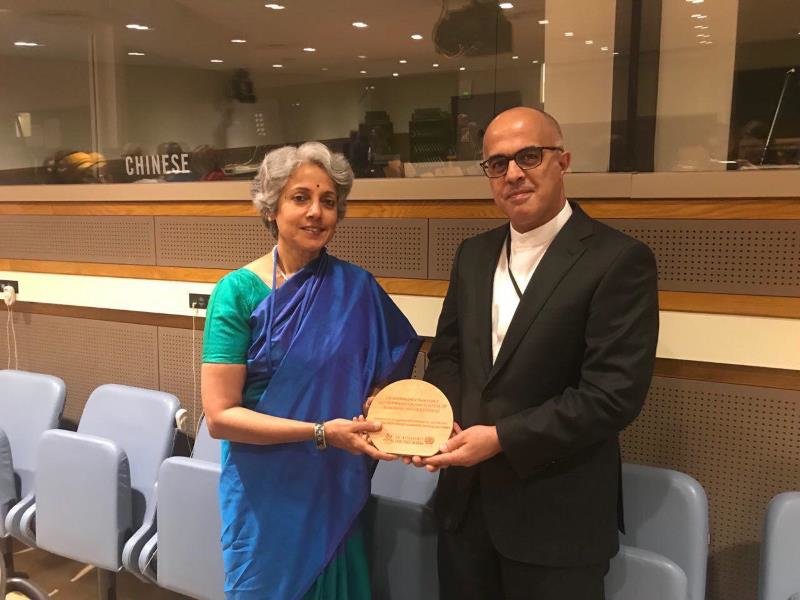Iran’s Noncommunicable Diseases Committee receives UNIATF award

TEHRAN — The UN Interagency Task Force on the Prevention and Control of Non-Communicable Diseases (UNIATF) award went to the Noncommunicable Diseases (NCDs) Committee of Iran’s Ministry of Health for making an outstanding contribution to NCD prevention and control.
Deputy Director General of Programmes at the World Health Organization (WHO), Somia Swaminatan, has granted the award to the representative of the Non-Communicable Diseases Committee during the “Friends of the Task Force” meeting on the sidelines of the third High-level Meeting on NCDs at the United Nations General Assembly in New York on September 27, 2018, IRNA news agency reported on Tuesday.
UNIATF at its 10th meeting in Vienna in February 2018 initiated the UNIATF award to recognize those making an outstanding contribution to NCD prevention and control.
The UNIATF awards are issued to individuals or groups of individuals for achievements in the area of multisector action in the prevention and control of NCDs for getting countries on the right trajectories in achieving NCD-related Sustainable Development Goals (SDGs).
Due to the efforts made over the past 40 to 50 years on improvement of the quality of fresh water, roads, education, electricity and health services, Iran is among the countries where trachoma is eradicated.In line with WHO’s activities to combat NCDs, in 2015, a committee has been stablished in Iran called National Non-Communicable Disease Committee at the Ministry of Health headed by the Health Minister, Hassan Qazizadeh Hashemi. There are six subcommittees affiliated with this committee responsible for controlling cancer, cardiovascular diseases, metabolic disorders, air pollution and inter-sectoral collaboration, traffic injuries, and a subcommittee for monitoring and evaluating whole action plan for the NCDs in Iran.
The national plan to combat NCDs was endorsed by President Hassan Rouhani, Parliament Speaker Ali Larijani, the then Director-General of WHO Margaret Chan Fung Fu-Chun and WHO Regional Director for the Eastern Mediterranean Ala Alwan, which was also appreciated by other countries due to not being limited to one ministry and sector but to other sectors as well.
Iranian health Minister Hassan Qazizadeh Hashemi has stated that while some 80 percent of deaths in the world are related to NCDs, the measures taken by Iran to reduce the burden of cancer, heart and lung diseases, and diabetes have been taken worldwide.
Hashemi went on to say that “we hope that the action plans can be also applied into practice by the public because prevention of these diseases first and foremost depends on a person's will, and then the administration and the parliament should also play their part.”
Moreover, an important measure Iran has taken on the eradication of trachoma (the leading infectious cause of blindness), has also been endorsed by the WHO, he further highlighted.
According to the WHO trachoma is a disease of the eye caused by infection with the bacterium Chlamydia trachomatis. It is known to be a public health problem in 41 countries, and is responsible for the blindness or visual impairment of about 1.9 million people. In 2016, 190.2 million people lived in trachoma endemic areas and were at risk of trachoma blindness.
“Due to the efforts made over the past 40 to 50 years on improvement of the quality of fresh water, roads, education, electricity and health services, Iran is among the countries where trachoma is eradicated,” he concluded.
FB/MQ/MG
Leave a Comment